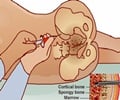Bone marrow transplant patients say two of the most debilitating side effects of the treatment are nausea and vomiting caused by chemotherapy and radiation.
Bone marrow transplant patients say two of the most debilitating side effects of the treatment are nausea and vomiting caused by chemotherapy and radiation.
But a Loyola University Health System study has found the drug aprepitant can dramatically reduce both nausea and vomiting when combined with other anti-nausea drugs.Seventy-three percent of patients receiving aprepitant experienced no vomiting during the study period, compared with 23 percent of patients who received a placebo. (Both groups also received a standard anti-nausea drug.) Forty-nine percent of aprepitant patients experienced no vomiting and little or no nausea, compared with 15 percent of the placebo group.
Dr. Patrick Stiff presenting findings at the 2010 BMT Tandem Meetings in Orlando, Fla. His study received a Best Abstract Award from the Center for International Blood & Marrow Transplant Research, one of two organizations sponsoring the meetings. The other sponsor is the American Society for Blood and Marrow Transplantation.
Aprepitant (brand name Emend®) was approved by the Food and Drug Administration in 2003 to help prevent and control vomiting and nausea from chemotherapy. However, there previously had been only a few small studies on the benefit of aprepitant in bone marrow transplant patients, who receive higher doses of chemotherapy than most other cancer patients. "We did not know how effective aprepitant would be for bone marrow transplant patients," Stiff said. "We now believe this should become a standard part of patients' care."
Bone marrow transplant patients say nausea/vomiting is the second-worst side effect of the treatment. (The only thing worse is mouth and throat sores.) Patients can throw up three to five times a day for a week or longer.
Other anti-nausea/vomiting drugs work by blocking signals from the stomach. But signals from the brain still can make a patient queasy. Aprepitant acts to block nausea/vomiting signals from the brain, and is taken together with drugs that block signals from the stomach.
Advertisement
The aprepitant group did not experience significantly more side effects than the placebo group. Aprepitant also had no meaningful impact on the success of the transplant, relapse rates or overall survival.
Advertisement
Loyola has the largest bone marrow transplant program in Illinois. "One of the main themes of our research is to make bone marrow transplants more patient-friendly," Stiff said. "Transplants are much more comfortable and easier to tolerate than they were a few years ago."
Previous studies at Loyola were instrumental in showing the effectiveness of the drug palifermin in preventing mouth and throat sores in transplant patients.
Source-Eurekalert
SRM















